SCUBA Travel
HEPCA, the Hurghada Environment Protection & Conservation Association, has launched the first underwater museum in Hurghada with the support of the Egyptian Ministry of Environment and Red Sea Governorate.
"After years of careful...
The Maritime and Coastguard Agency (MCA) is asking UK divers to help identify pollution seeping from historic wrecks, BSAC announced today.
The MCA occasionally receives reports of oil pollution associated with shipwrecks, although this...
Scuba Schools International (SSI) and Mares have partnered up with the female-led diving team Edges of Earth Expedition. Together, they are amplifying ocean action and highlighting progress in marine conservation worldwide.
Edges...
Croatia boasts an impressive range of wrecks for every experience level. Dive in and you can embark on a journey through maritime history and surface to the beautiful landscapes Croatia is famous for. Read on for our pick of Croatia’s top wreck dives.
Wikipedia defines The whale shark (Rhincodon typus) as a slow-moving, filter feeding carpet shark and the largest known extant fish species. The largest confirmed individual had a length of 18.8 m (61.7 ft)
Volunteering...
The seasons are beginning to change around the world in May and bring favourable dive conditions for some of the best destinations in the world.
Australia
It is a great month...
See the latest list of the best wreck diving sites...
1. The Yongala, Australia
Claiming the title of the best wreck dive in the world, is the Yongala. Full of...
Planning your January trip? There are loads of fantastic places to go at the start of the year. Mexico scuba diving in January is all about huge megafauna. The small African nation of Djibouti is also at...
Where to scuba dive in December? Mantas and whale sharks at Hanifaru Bay; mass spawning of barracuda & Nassau grouper in Belize - groupers circling each other, releasing their spawn as they go; mating turtles & schools of hammerheads in the Galapagos
Turtles are amazing creatures, found around the world in tropical and subtropical waters. They play a vital role in marine ecosystem health and have been in the ocean for more than 100 million years.




























